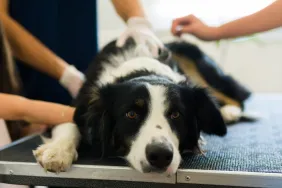When you watch your dog running around your yard at full throttle for hours, or when you feel his mighty pull at the other end of a rope when you play tug-of-war, it’s easy to think to yourself, “My dog is strong.” But his real strength starts on the inside, with his immune system. Because if his ability to fend off disease and illness is weak, sooner or later it will affect his quality of life.
Your dog’s immune system is complex and can be impacted by his diet. Let’s take a top-line look at how this system works and what you can do to help support his health.
Canine Immunity 101
Think of your dog’s immune system as his “inner guard dog.” Like a guard dog, his immune system keeps vigilant watch, detecting foreign invaders, such as bacteria and viruses. To accomplish that difficult but vital task, the immune system has two basic sub-systems: the innate immune system and the adaptive immune system.
Innate immune system. This system works to keep the foreign invaders out of your dog’s body and, if they succeed in entering, to prevent them from spreading. Your dog’s skin, for example, is part of his innate immune system. The innate immune system also includes the digestive system, which is also key in protection from foreign substances that may enter your dog’s body. The mucus linings in his respiratory system also help with this type of protection. Day in and day out, a healthy dog’s innate immune system does a good job of protecting him from a wide range of potentially harmful agents.
Adaptive immune system. In complex organisms like your dog, an innate immune system isn’t always sufficient, and foreign substances manage to enter the body. In those cases, your dog’s adaptive immune system becomes activated to fight the invaders. This system is what many of us think about when we hear the words “immune system.”
Antioxidants, diet, and immunity strength
You’ve probably heard about antioxidants, but you may not know what they are and how they work. Here’s an overview:
Antioxidants, such as vitamins C and E, are nutrients that have been shown to help inhibit cellular damage caused by free radicals. Free radicals are formed when compounds lose an electron in their structure. They are unstable because electrons “prefer” to be paired. That’s why free radicals are prone to attack healthy cells to steal their electrons. This can cause damage to the healthy cells and even to DNA. This may eventually lead to the development of disease and aging in dogs, as well as humans.
Antioxidants help protect healthy cells by donating electrons to free radicals, thereby reducing damage to other cells.
Research conducted by WALTHAM, THE WORLD’S LEADING AUTHORITY ON PET CARE AND NUTRITION®, indicates that supplementation of the key antioxidant nutrients vitamins E and C together, and well above minimum requirements, can provide synergistic benefits to support the effectiveness of the immune system. This helps maintain cell function and integrity.
The PEDIGREE® Brand has reformulated its dry food recipes based on the WALTHAM® research. New PEDIGREE® Food for Dogs contains improved levels of vitamins E and C to promote a strong immune system for your dog.









